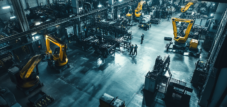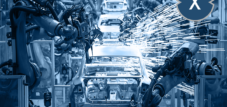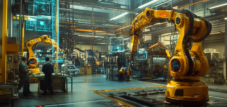Market analysis Pennsylvania: target industries for mechanical engineering and automation technology
Xpert pre-release
Language selection 📢
Published on: July 9, 2025 / update from: July 9, 2025 - Author: Konrad Wolfenstein

Market analysis Pennsylvania: target industry for mechanical engineering and automation technology - Image: Xpert.digital
Why Pennsylvania is the perfect market for warehouse system providers from Germany
From the steel state to Tech-Hub: Industriestate Pennsylvania attracts with billions of logistics revolution
This article provides a detailed market analysis by the US state of Pennsylvania with the aim of identifying the most attractive industries for providers of mechanical engineering, automatic storage systems and material flow technology. Pennsylvania presents itself not only as an important industrial state, but as a strategic hub in the heart of the economically strongest region in the United States. The analysis shows a unique meeting of a massive, growing logistics infrastructure, a diversified industrial basis and a worldwide leading innovation ecosystem for robotics and automation. This convergence, actively promoted by an economic -friendly state government, creates an exceptionally cheap environment for highly developed automation solutions.
Suitable for:
- Understand the USA better: a mosaic of the state states and EU countries in comparison-analysis of the economic structures
Prioritized target industries
- Distribution, logistics & e-commerce: This is by far the largest and most direct market. Driven by the e-commerce boom and the strategic location of Pennsylvania, there is a massive, unknown need for automation solutions-from large distribution centers to specialized third-party logistics service providers (3PL).
- Pharmaceutical industrial & biosciences: A highly profitable sector with demanding, non -negotiable requirements for precision, traceability and compliance with regulatory requirements (FDA). The automation needs are specialized and value -oriented, especially in the areas of sterile handling, packaging and cold chain logistics.
- Food and beverage industry: A large, stable sector that is under constant pressure to modernize processes, improve hygiene standards and to counteract the shortage of labor through automation. The need ranges from processing to packaging to paletting.
- Metal products & mechanical engineering: This traditional sector offers considerable long -term potential. The focus here is on the modernization of existing systems for increasing efficiency, security and global competitiveness through technologies such as robot welding and automated machine loading.
Geographic key regions
The greatest opportunities focus on three "corridors of the possibilities":
- Lehigh Valley & Greater Harrisburg (Central/East-Pa): The undisputed epicenter for logistics and distribution, shaped by huge e-commerce and 3pl hubs along important motorway corridors.
- Greater Philadelphia: The Heart of the Biosci Product and Pharmaceutical Industry in the state, home of global corporations and a dynamic biotech ecosystem.
- Pittsburgh Region (West-Pa): The center of the robotics and AI innovation ecosystem, driven by Carnegie Mellon University, as well as a recovering location for advanced production and multimodal logistics.
Central strategic knowledge
Success in Pennsylvania requires a strategy that understands the interaction of these elements. It is not about looking at individual industries in isolation, but using the synergies. The logistics infrastructure drives demand in production, while the Pittsburg innovation ecosystem delivers the technological solutions and talents to meet this demand. The state government acts as an active sponsor who specifically directs investments in strategic sectors and supports companies.
Summary of the recommendations
A market entry strategy is recommended. Phase 1 focuses on the logistics sector in East and Central Pennsylvania in order to quickly gain reference projects and market shares. Phase 2 provides for an expansion into the specialized sectors food/drinks and biosciences. In phase 3, a technology and partnership level in the Pittsburgh region should be built up to use the robotics ecosystem and to open up the long-term modernization opportunities in traditional mechanical engineering. A proactive cooperation with government agencies such as the Ministry of Community and Economic Development (DCED) and Ben Franklin Technology partners is crucial right from the start to accelerate and de-risk the market.
Pennsylvania business location: a strategic overview of mechanical engineering
In order to fully record the potential of pennsylvania for providers of automation technology, the state does not have to be regarded as an isolated unit, but as a strategic point of peak within the North American economic area. Its geographical location, robust economy and first-class infrastructure form the basis for the high demand for mechanical engineering and material flow technologies.
Geostrategic positioning in the northeast corridor
Pennsylvania occupies a unique geostrategic position on the US east coast. The state offers truck access to four of the ten largest markets in the United States within one day, including the Metropolitan Regions of New York City and Washington, DC. This proximity to huge consumer centers is the fundamental driver for its dominance as a logistics and distribution hustle and bustle. Pennsylvania acts as a critical link that connects the industrial core of the middle west with the populated coastal regions and the important im- and export ports. For European companies who want to open up the North American market, Pennsylvania offers an ideal bridgehead that enables efficient distribution into the most important economic areas.
Fundamental economic pillars
Pennsylvania's economy is broadly diversified and is based on several strong columns that are directly relevant for mechanical engineering. With a contribution of $ 86.7 billion, the manufacturing trade (manufacturing) is one of the three largest economic sectors in the state. Likewise, the Health and Social Affairs (Healthcare and Social Assistance) sector, which includes the flourishing biosciences industry, is a driving force for GDP ($ 87.7 billion) and employment (1.26 million people).
It is crucial that the state government recognized these strengths and anchored in its business strategy. Five sectors were identified as key industries for targeted investments and funding: processing businesses, organic sciences, agriculture, energy and robotics & technology. This official prioritization gives companies a clear orientation in which areas of state support, accelerated approval procedures and financial incentives can be expected.
The following table gives an overview of the most important partial sectors of the processing trade in Pennsylvania, ordered according to their contribution to GDP and their importance as an employer. It illustrates the variety of industrial landscape and the associated different market opportunities.
Pennsylvania's most important partial sectors of the processing trade according to GDP and employment

Pennsylvania's most important partial sectors of the processing trade according to GDP and employment - Image: Xpert.digital
Note: The number of employees comes from a separate analysis and can refer to slightly different periods, but reflect an exact size.
This data show a differentiated image: While the chemical industry makes the biggest contribution to GDP, the sectors mechanical engineering, metal products and food processing are the largest employer. A high number of employees indicates a large number of companies and a broad industrial basis, which implies a wide range of options for automation projects of different sizes and complexity.
Pennsylvania has a diversified structure in the processing industry, whereby various sub -sectors contribute significantly to the gross domestic product and employment. The largest GDP contribution is made by the chemical products sector with $ 20,229.9 million in 2019, in which over 50,000 people are employed. The metal generation follows with a GDP contribution of $ 7,509.7 million. The area of food, drinks and tobacco generates USD 10.201.4 million and employs 88,418 people, which makes it the largest employer among the sectors listed. Metal products contribute $ 8,001.0 million to GDP and offer 78,979 jobs. Mechanical engineering generates USD 6,130.2 million and employs 83,280 people. Computers and electronic products as well as plastics and rubber products also make significant contributions to GDP with 5,130.5 and $ 4,850.8 million, with both sectors over 50,000 employees each.
Infrastructure: the backbone of automation
The first-class infrastructure of Pennsylvania is not only a passive location advantage, but also acts as an active demand multiplier for automation. Any improvement in the logistical capacity increases the pressure on the nodes of the network - warehouses, distribution centers and production centers - to increase their efficiency through automation in order to be able to manage the increased throughput.
Road and rail network
A first-class network of Interstate highways, including the corridore I-81, I-83, I-78 and I-76, combine the most important economic centers in the state and the rest of the country. This is supplemented by over 1,300 miles (approx. 2,092 km) on freight rail lines that are operated by three class-1 railway companies (CSX, Norfolk Southern, Canadian National). Intermodal terminals, such as that of Norfolk Southern in the Pittsburgh region, are crucial for the smooth transport of raw materials and ready -made goods.
Air and sea freight
The international airports in Pittsburgh (Pit) and Philadelphia are important air freight rotation crosses. Large logistics companies such as Fedex, UPS and Amazon operate significant sorting and storage facilities there. The strategic proximity of the eastern logistics hubs for the ports of Philadelphia, New Jersey and New York is a decisive advantage for global trade. In the west of the state, the Port of Pittsburgh, one of the largest inland portrait regions in the United States, offers access to 200 miles navigable waterways and over 200 river terminals, which enables the cost -effective transport of bulk goods and heavy loads.
Strategic investments
The state continuously invests in the expansion of its infrastructure, which is to be seen as a clear signal for long -term commitment and future demand for automation. Examples of this are the construction of a new $ 1.4 billion at the Pittsburgh Airport, which is to be opened in 2025, and an investment of over $ 857 million in the modernization of the Montgomery Lock and Dam. Such investments increase the capacity of the overall system and directly create the business case for automated loading and unloading, high-speed sorting and automatic storage and provision systems (AS/RS) in the connected.
Our recommendation: 🌍 Limitless reach 🔗 Networked 🌐 Multilingual 💪 Strong sales: 💡 Authentic with strategy 🚀 Innovation meets 🧠 Intuition
At a time when a company's digital presence determines its success, the challenge is how to make this presence authentic, individual and far-reaching. Xpert.Digital offers an innovative solution that positions itself as an intersection between an industry hub, a blog and a brand ambassador. It combines the advantages of communication and sales channels in a single platform and enables publication in 18 different languages. The cooperation with partner portals and the possibility of publishing articles on Google News and a press distribution list with around 8,000 journalists and readers maximize the reach and visibility of the content. This represents an essential factor in external sales & marketing (SMarketing).
More about it here:
From Amazon to Merck: Pennsylvania's automation boom in distribution and biosciences
Analysis of the primary target industries: opportunities for automation and material flow technology
The wide -ranging economic structure of Pennsylvanias offers a variety of starting points for automation technology. The analysis focuses on the sectors with the highest immediate need, the greatest value potential and the strongest strategic support from the state. The chances can be divided into two main categories: “Greenfield” projects in rapidly growing sectors with new systems and “modernization” projects in established industries that have to retrofit existing companies. A successful market entry requires strategies that are tailored to both scenarios.
Suitable for:
- Globalization rethought: US experts asked – focus on expansion in the US market – production in the USA?
The following table summarizes the profiles of the most important target industries and enables a direct comparison of their characteristic features and automation needs.
Profile of the most important target industries for automation in Pennsylvania

Profile of the most important target industries for automation in Pennsylvania - Image: Xpert.digital
Pennsylvania offers four central target industries for automation solutions with different profiles and requirements. The area of distribution, logistics & e-commerce is the largest and most dynamic industry, led by market leaders such as Amazon, Fedex, UPS and Urbn as well as numerous third-party providers such as A. Duie Pyle and Saddle Creek. This industry concentrates geographically on the Lehigh Valley, Greater Harrisburg and the Pittsburgh region and shows very high automation affinity. The primary need for automation includes AS/RS systems, autonomous mobile robots (AMRS), high-speed sorting, robot palleting as well as the integration of warehouse management systems (WMS) and storage control systems (WCS).
The food and beverage industry presents itself as a large, stable industry with important actors such as Kettle & Fire, Mr. Foods, Utz, Just Born, Coca-Cola and Ocean Spray. This industry is mainly located in the Lancaster County and Lehigh Valley, but extends nationwide and has high automation affinity. The automation requirements focus on hygienic robots for pick & place applications, packaging automation, palletry systems and quality control.
The pharmaceutical and bioscientific sector is characterized by very large sales and continuous growth, with important companies such as Merck, GSK, J & J, Sanofi, B. Braun, Olympus and numerous biotech companies. This industry concentrates on Greater Philadelphia, the Lehigh Valley and Northeast PA and shows very high automation affinity. The specific automation requirements include sterile robotics, serialization with track & trace functionality, cold chain logistics and precise filling technologies.
The metal products and mechanical engineering industry is a large, mature market, represented by companies such as Westinghouse, Mack Trucks, Rhoads Industries, Mark Metals and numerous small and medium-sized companies. This industry is mainly based in the Pittsburgh region, but extends nationwide and has an average to high automation affinity. The automation needs concentrate on robot welding, CNC machine loading, automated presses and heavy material handling systems.
Distribution, logistics and e-commerce
This sector represents the largest and most immediate chance for automation providers in Pennsylvania. The state has developed into one of the most important logistics hubs on the US East coast, driven by the unstoppable rise of e-commerce and its strategic proximity to the large consumer markets. The massive presence of Amazon, which employs 30,000 people in the state and operates numerous fulfillment centers and sorting centers, is the clearest indicator of the immense volume. In the Pittsburgh region alone, Amazon maintains a fulfillment center, two plants for medium-range transport, four delivery stations for the last mile and an air freight gateway. Fedex Ground also has its headquarters in Pittsburgh, and UPS is massively investing in its investments in the state.
The automation requirement in this sector is wide and demanding. It includes high-speed sorting systems for coping with millions of packages daily, large-scale automatic warehouse and provision systems (AS/RS) to maximize the storage density, briskly from autonomous mobile robots (AMRS) for flexible picking and transport processes as well as robot arms for automatic palleting and depalating. The seamless integration of this hardware through highly developed warehouse management systems (WMS) and storage control systems (toilet) is crucial. Leading 3PL providers such as Maple Logistics Solutions explicitly advertise with the use of “automated processes” and the latest scan technology to increase their efficiency.
The geographical priorities are clearly defined:
- Lehigh Valley (Allentown, Bethlehem, Easton): This region has developed into a mega hub for national distributors and 3PLs. Companies such as Derby Supply Chain Solutions, Sharp (pharmaceutical packaging) and Ocean Spray use the proximity to the ports of New York/New Jersey and direct access to the big metropolises.
- Greater Harrisburg (Harrisburg, Carlisle, York): This corridor in Central Pennsylvania is a critical hub at the intersection of important Interstate Highways. It is the location of countless distribution centers, including ACME Distribution, all distribution and D&D Distribution Services.
- Pittsburgh region: With its excellent multimodal infrastructure (street, rail, air, water), West Pennsylvania is an emerging hub. In addition to Fedex and Amazon, the fashion group Urbn also built an 880,000 square foot (approx. 81,750 m²) in large distribution center.
Processing business
Food and beverage industry
The food and beverage industry is one of the largest and most stable manufacturing sectors in Pennsylvania. It contributes over $ 10 billion to GDP and is the largest employer in the processing industry with over 88,000 employees. The state is a nationally leading producer of mushrooms, pretzels, potato chips and ice cream. This sector is under the constant pressure to increase efficiency, to comply with strict hygiene standards and to react to the continued shortage of labor, which makes it a first -class candidate for automation.
The need focuses on robust, hygiene rights (wash-down-capable) automation solutions. This includes robots for pick-and-place applications in primary processing, automated packaging lines for primary and secondary packaging (e.g. cardboard boxers, box packers) and pallet animal systems at the end of the line. Camer -based quality control systems for inspection of products and checking packaging integrity are also increasingly in demand.
The most important actors include well-known brands such as Utz Brands, Mr. Foods and DF Stauffer Biscuit Co. in the snack area, Just Born (manufacturer of the Peeps) in the Soxwarware segment as well as large beverage manufacturers such as Coca-Cola and Ocean Spray, which operate significant production facilities in the Lehigh Valley. The dynamics of the sector are underlined by recent investments: Kettle & Fire, a rapidly growing food company, has built a new $ 19.1 million production facility in Lancaster County with the support of the state government. This is a prime example of a “Greenfield” project, in which the latest automation can be implemented from scratch.
Pharmaceutical industry and biosciences
Pennsylvania, especially the region around Philadelphia, is a global center for the biosci science industry. The sector is an economic heavyweight: the wholesale of medicinal products, cosmetics and toilet articles with sales of $ 86.4 billion is the third largest industry in the state. The entire bio-scientific industry is estimated at a value of almost $ 50 billion and comprises over 3,000 companies.
The automation requirements in this sector are extremely high and are determined by strict regulatory requirements of the FDA, the need for process validation and the high value of the products.
- Manufacturing: Precise robot handling in sterile clean room environments, automated filling and locking systems as well as high-speed tablet presses.
- Packaging: Highly developed serialization and track-and-trace systems are essential to ensure product safety and combat counterfeits. Automated cardboard and end packaging lines must meet these requirements.
- Logistics: Automatic cooling chain storage (e.g. AS/RS in chilled or frozen environments) and validated material transport systems are of crucial importance for many products, especially biopharmaceuticals.
The most important clusters are:
- Greater Philadelphia: known worldwide as “Cellicon Valley” for his leading role in cell and gene therapy. Global giants like Merck (with 9,500 employees at the West Point location), Glaxosmithklin (GSK), Johnson & Johnson and Johnson and Bristol Myers Squibb as well as a large number of innovative biotech companies are located. The Penn Center for Innovation of the University of Pennsylvania is an important engine for research and development.
- Lehigh Valley: A growing center with companies like B. Braun Medical, which recently completed a $ 200 million extension, Olympus (medical technology) and Sharp (specialized pharmaceutical packaging).
- Northeast Pa: Home Great Production Sea such as Sanofi Pasteur (vaccines, 3,000 employees in Swiftwater) and Endo Pharmaceuticals (3,500 employees in Malvern).
Metal products and mechanical engineering
These sectors form the traditional industrial foundation of Pennsylvania. With a GDP contribution of $ 8 billion (metal products) or $ 6.1 billion (mechanical engineering) in 2019 and a high number of employees of 79,000 and 83,000 people, they are still of great economic importance. The automation requirement in these industries is primarily driven by modernization. Many companies have to retrofit existing systems to remain competitive, increase productivity and improve security at work.
The need focuses on robot welding, the automation of the machine exposure (CNC machines, presses), robot-based grinding and deburring as well as the automated handling of heavy and unwieldy materials such as sheets, sticks and cast parts. In Cumberland County, for example, companies are looking for advanced production for specialists who can handle robotics and modern manufacturing equipment.
The sector is more fragmented than the pharmaceutical industry and consists of a mixture of large companies and numerous small and medium -sized companies. The well -known actors include Westinghouse (components for the nuclear industry), Mack Trucks (vehicle assembly), US Steel and a variety of metal processors such as Mark Metals in Reading and Remaly Manufacturing. A most recent example of the potential in the heavy industry is the almost $ 100 million investment of Rhoads industries in the expansion of its shipbuilding and manufacturing activities in the Philadelphia Navy Yard, which will create 450 new jobs. This is a typical “Brownfield” project in which automation is integrated into existing structures in order to expand capacity.
Chemical and plastic industry
With a GDP contribution of over $ 20 billion, the chemical industry is an economic power center in Pennsylvania. The plastic and rubber industry adds another $ 4.8 billion. These sectors are important suppliers for other key industries such as the biosciences, construction and automotive industry.
While process automation in the chemical industry is highly specialized, there is a significant need for material flow technology. This includes the robot-supported palletization of sacks, barrels and other containers, the use of driverless transport systems (FTS/AGVS) for secure material transport in potentially dangerous environments as well as automated packaging and winding systems at the end of the production line. Important companies are Air Products & Chemicals with headquarters in Allentown (3,500 employees) and East Penn Manufacturing, a leading battery manufacturer with 7,800 employees.
🎯🎯🎯 Benefit from Xpert.Digital's extensive, fivefold expertise in a comprehensive service package | R&D, XR, PR & SEM

AI & XR 3D Rendering Machine: Fivefold expertise from Xpert.Digital in a comprehensive service package, R&D XR, PR & SEM - Image: Xpert.Digital
Xpert.Digital has in-depth knowledge of various industries. This allows us to develop tailor-made strategies that are tailored precisely to the requirements and challenges of your specific market segment. By continually analyzing market trends and following industry developments, we can act with foresight and offer innovative solutions. Through the combination of experience and knowledge, we generate added value and give our customers a decisive competitive advantage.
More about it here:
Pennsylvania as an automation hotspot: Why the state becomes a magnet for technology companies
The innovation ecosystem: technology driver and state support
A decisive advantage of Pennsylvania is that the state not only offers a market for automation, but also a rich and supportive ecosystem that can make it easier to enter the market and de-risk investments. This ecosystem consists of two main pillars: a worldwide leading cluster for robotics and automation and a network of coordinated state funding programs. For a foreign company, this ecosystem is not just a background feature, but an active tool for sales, marketing and strategic partnerships.
Robotics and automation: The Pittsburgh epicenter
The Pittsburgh region has developed into one of the world's leading centers for robotics and artificial intelligence. This concentration of talents, research and commercial activity offers unique opportunities for partnerships, technology transfer and the recruitment of specialists.
Academic basis
The heart of the ecosystem is Carnegie Mellon University (CMU), which in 1979 founded the world's first Robotics Institute (RI) and offered the first doctoral course in robotics. The Robotik-Institut (RI) and its commercial arm, the national robotics engineering center (NREC), work closely with industry to develop and commercialize technologies. In order to further expand this management position, the CMU is currently building the Robotic Innovation Center (RIC), a 150,000 square foot (approx. 13,900 m²) large, state-of-the-art research institution at Hazelwood Green, a former steel unit.
Commercial ecosystem
Over 140 robotics organizations are located in the Pittsburgh region that cover a wide range of automation solutions. This includes:
- Warehouse and logistics automation: Seegrid (one of the pioneers for autonomous mobile robots), Onward Robotics (formerly IAM Robotics, specializing in autonomous picking robots) and Bossa Nova Robotics (robotics for retail).
- Industrial production automation: Premier Automation (a leading system integrator), Gecko Robotics (inspection robot for critical infrastructures), Carnegie Robotics (robust autonomous solutions for demanding environments), Hebi Robotics (modular robotic components) and finish robotics (automation for the Building industry).
- Autonomous vehicles: Aurora and Stack AV, leading developer of self -driving technology for trucks.
Support network
The ecosystem is funded by a dense network of support organizations. The Pittsburg Robotics Network (PRN) serves as a central point of contact and advocacy for the industry. Innovation Works is one of the most active start-up capital investors in the USA and supports start-ups with capital and mentoring. The Institute for Progressive Robotics in Manufacturing (ARM) is a nationwide public-private partnership based in Pittsburgh, which focuses on promoting robot technology in production.
State initiatives and funding programs
The government of Pennsylvania under Governor Shapiro pursues a proactive economic strategy that aims to position the state as a leading location for production and technology. A number of authorities and programs were created to support companies in investments, expansion and training of specialists.
Speed agency- Ministry of Community and Economic Development (DCED)
The DCED is the central coordination center for business development in Pennsylvania. His governor's action team serves as a “concierge service” for companies that want to invest or expand in the state, and put together tailor-made support packages. The DCED's international business development is specifically responsible for supporting foreign companies in the settlement.
Important funding and support programs
The state government has put up a portfolio of programs that are tailored to the needs of manufacturing companies and technology providers. The latest investment announcements by the Shapiro administration are concrete evidence of how these programs are used in practice:
- Industrial development authority of Pennsylvania (PIDA): offers low-interest loans for the acquisition of land and buildings, construction and renovation costs as well as the purchase of machines and systems. The latest examples are a PIDA loan of $ 2.4 million for Premier Automation and a $ 4 million loan for Kettle & Fire.
- Innovation program for the processing business in Pennsylvania: A unique fellowship program that brings university students together with manufacturers to solve real challenges. This promotes direct technology transfer from science to industry. The government recently invested $ 2.8 million in $ 42 new projects.
- Ben Franklin Technology Partner (BFTP): A nationwide recognized model for technology -based business development. BFTP offers start-up capital investments and technical know-how for start-ups (Gecko Robotics received early start-up financing) and established manufacturers who want to innovate.
- Workforce development (personnel development): Programs such as the subsidy for vocational training in the processing business in Pennsylvania (MTTC) and Wednetpa provide funds to train new and existing employees in new technologies. This is a direct answer to the shortage of skilled workers. One example is a grant of almost $ 200,000 to the Northampton Community College for courses in precision processing.
The following table offers a practical overview of the most important state support programs.
Important government funding programs for production and technology in Pennsylvania

Important state funding programs for manufacturing and technology in Pennsylvania - Image: Xpert.digital
Pennsylvania offers various important state support programs for manufacturing and technology. The Pida loan program provides low-interest loans for fixed assets and is aimed at expanding manufacturers and construction projects. Typical funding is between $ 400,000 and $ 2.4 million. A real example is Premier Automation, which received a $ 2.4 million pida loan for the expansion of his production.
The innovation program for the manufacturing business in Pennsylvania focuses on F&-cooperation and innovation for manufacturers with technological challenges. It offers grants up to $ 70,000 per project. Penn State Researchers, for example, work with Phillips Mushroom Farm on new building materials from mushroom waste.
Ben Franklin Technology Partner (BFTP) offers early phase financing and technical expertise for technology start-ups and established manufacturers. The program includes starting capital investments of $ 10,000 to $ 150,000 or more as well as consulting services. Gecko Robotics received early start -up capital financing of $ 10,000.
The subsidy for vocational training in the processing industry in Pennsylvania (MTTC) focuses on the training of specialists and is aimed at manufacturers with specific training needs. Grants are granted to cover training costs. The Northampton Community College received about $ 194,000 for the training of cutting mechanics.
Pennsylvania First (PA First) focuses on creating jobs and supports companies that invest significantly and create jobs. The program offers performance -based grants, with Premier Automation receiving a grant of $ 444,000.
The proactive use of these programs can make the decisive difference for a company. They not only reduce the costs of investing, but also signal potential customers that a project is supported by the state government, which increases credibility and trust.
Strategic synthesis and recommendations for action
The comprehensive analysis of the economic framework, the target industry and the supportive ecosystem in Pennsylvania enables the formulation of a clear, prioritized and implementable strategy for the market entry and the growth of a provider of mechanical engineering and automation technology.
Prioritization of market opportunities
The identified target industries offer different profiles in terms of market size, urgency of the needs and value creation potential. Strategic prioritization is essential for focused and efficient resource use.
- Priority 1: Distribution, logistics & e-commerce. This is the largest, most dynamic and most immediate market. The sheer amount of new and expanding “Greenfield” distribution centers requires immediate, scalable automation solutions. The market entry here promises quick sales growth and the structure of important references.
- Priority 2: Pharmaceutical industrial & biosciences. This sector offers the highest potential for value. The automation requirements are highly specialized and strong. A commitment requires deep industry know-how and the ability to deliver validated, compliant systems. The market is more concentrated, but customer relationships are long -term and profitable.
- Priority 3: Food and beverage industry. A large and constant market that offers a mixture of “Greenfield” projects (such as Kettle & Fire) and “Modernization” supplies. The need to meet hygiene standards and reduce labor costs creates continuous demand for automation.
- Priority 4: metal products & mechanical engineering. This is a long -term strategic opportunity. The market is ripe and mainly consists of “modernization” projects. The sales cycle is potentially longer and requires a consulting -intensive approach to demonstrate the ROI for retrofitting existing systems. However, the potential is significant due to the size of the industrial basis.
Recommended market entry strategy
Based on prioritization, a three -phase strategy is recommended to gradually and sustainably open up the market:
Phase 1 (years 1-2): Focus on logistics & distribution
- Goal: Fast market penetration and structure of an operational basis.
- Actions: Building a sales and service presence in the Lehigh region Lehigh Valley or Greater Harrisburg. Concentration on the acquisition of projects at large 3PLs, e-commerce companies and retail distributors. The goal is to secure the first reference projects, to generate cash flow and to build a reputation for reliable project processing in the most highest market segment.
Phase 2 (years 2-4): Expansion in specialectors
- Goal: diversification in higher quality market segments.
- Actions: Building specialized sales and engineering teams for the sectors Food/Drinks and Biosciences. Use of the credibility obtained in phase 1. Respect for a second presence or targeted sales activities in the Greater Philadelphia region to use the proximity to the biosci science cluster. Development of industry solutions that are tailored to the specific requirements (hygiene, FDA conformity).
Phase 3 (years 3-5): Engagement in the innovation ecosystem and development of the modernization markets
- Goal: Secure the technology leader and open up long -term growth potential.
- Actions: Establishment of a small technology or F & E-Office in the Pittsburgh region. Active networking and building partnerships with local robotics companies (e.g. for components or specialized software) and Carnegie Mellon University. With the established market presence and the cash flow from the first two phases, the more complex modernization projects in the metal and mechanical engineering industry can now be targeted.
Suitable for:
- Marketopportunity USA: A strategic analysis of California leading industries for mechanical engineering and automated systems
Use of the local ecosystem
Proactive integration into the local ecosystem is a crucial success factor. The following steps are recommended:
- Immediately: contact with the DCED international business development office in order to imagine as a potential foreign investor and to probe the available support services. At the same time, a conversation with the regional representatives of the Ben Franklin technology partners should be sought to use their network and expertise.
- Short-term: Membership in important industry associations such as Biosciences Pennsylvania (LSPA) and the Pittsburg Robotics network (PRN). Participation in their events is the fastest way to establish important contacts with potential customers, partners and talents.
- In the medium term: Checking a research cooperation with one of the leading universities (e.g. Penn State, Lehigh University, Carnegie Mellon) as part of the innovation program for the processing business in Pennsylvania. This can help to develop tailor -made solutions for the local market and at the same time to gain access to highly qualified graduates.
Summary recommendations for action
Pennsylvania offers an exceptionally attractive environment for providers of automation technology. The combination of massive logistical demand, a diversified industrial basis and a first-class innovation and funding ecosystem creates a rare constellation of opportunities. The key to success lies in a strategic, phase -appropriate approach that initially focuses on the volume -strong markets in order to create a solid basis and then gradually expands into the higher -quality and long -term segments. The proactive use of state support offers and integration into the local innovation network will significantly accelerate the market entry and strengthen the competitive position sustainably.
The next specific steps for management should be:
- Implementation of targeted location visits in the logistics hubs of the Lehigh Valley and the Harrisburg region to get a direct feeling for the market.
- Initiation of the official contact with the DCED to present your own company and its investment intentions.
- Identification of potential local partners - be it system integrators, specialized robotic companies or consulting companies - from the organizations mentioned in this report to check synergies for market entry.
Xpaper AIS - R&D for Business Development, Marketing, PR and Content Hub

Xpaper AIS Ais Possibilities for Business Development, Marketing, PR and our Industry Hub (Content) - Image: Xpert.digital
This article was "written". My self-developed R&D research tool 'Xpaper' used, which I use in a total of 23 languages, especially for global business development. Stylistic and grammatical refinements were made in order to make the text clearer and more fluid. Section selection, design as well as source and material collection are edited and revised.
Xpaper News is based on AIS ( Artificial Intelligence Search ) and differs fundamentally from SEO technology. Together, however, both approaches are the goal of making relevant information accessible to users - AIS on the search technology and SEO website on the side of the content.
Every night, Xpaper goes through the current news from all over the world with continuous updates around the clock. Instead of investing thousands of euros in uncomfortable and similar tools every month, I have created my own tool here to always be up to date in my work in the field of business development (BD). The xpaper system resembles tools from the financial world that collect and analyze tens of millions of data every hour. At the same time, Xpaper is not only suitable for business development, but is also used in the area of marketing and PR - be it as a source of inspiration for the content factory or for article research. With the tool, all sources worldwide can be evaluated and analyzed. No matter what language the data source speaks - this is not a problem for the AI. Different AI models are available for this. With the AI analysis, summaries can be created quickly and understandably that show what is currently happening and where the latest trends are-and that with Xpaper in 18 languages . With Xpaper, independent subject areas can be analyzed - from general to special niche issues, in which data can also be compared and analyzed with past periods.
We are there for you - advice - planning - implementation - project management
☑️ Our business language is English or German
☑️ NEW: Correspondence in your national language!
I would be happy to serve you and my team as a personal advisor.
You can contact me by filling out the contact form or simply call me on +49 89 89 674 804 (Munich) . My email address is: wolfenstein ∂ xpert.digital
I'm looking forward to our joint project.
































